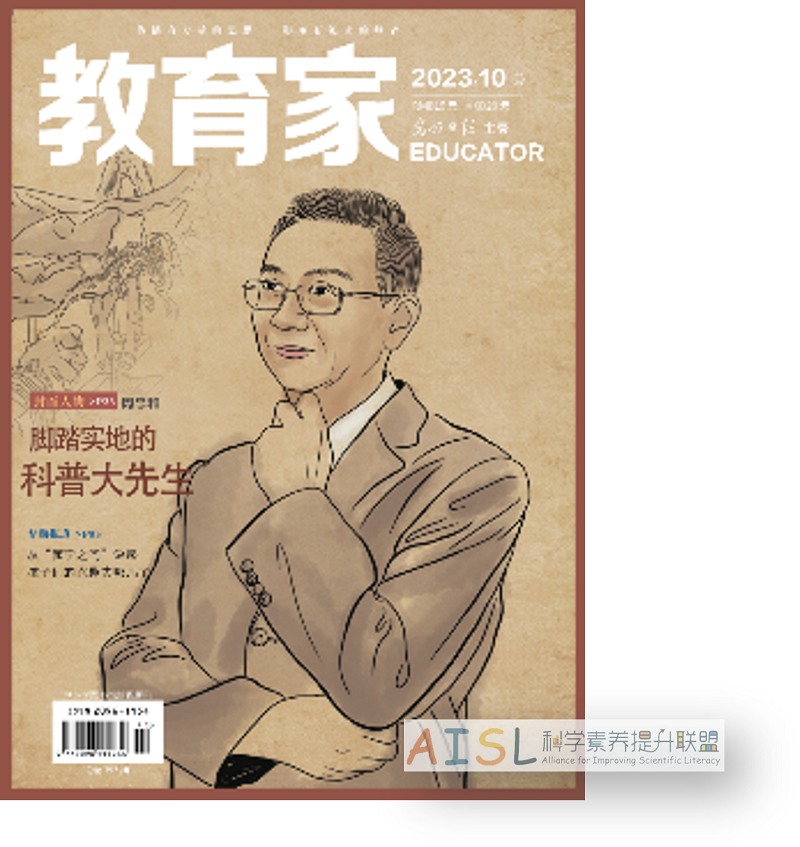2023年11月9日下午,北京师范大学“社会性科学议题学习(SSI-L)”项目以线上线下结合的形式举行会议,线下会议地点是北京师范大学京师学堂第五报告厅,议程主要包括项目进展、期刊发表和年会筹备等内容。SSI-L项目的学科指导专家、区域代表、合作校代表以及特邀专家出席了本次会议。SSI-L项目负责人、北京师范大学中国基础教育质量监测协同创新中心科学提升部主任林静主持会议。

线下参会嘉宾合影
【项目进展报告】

林静汇报了SSI-L项目的进展。林静概要地介绍项目从2020年3月至今的研究进程,目前初具全国、区域、校本三级联动教师行动研究共同体,项目团队教师研究学生、研究学情,联系社会热点问题构建跨学科融合学习情境,现在正在进一步着眼于超越考试评价、发展学生素养的定位与理念上,突破驱动性问题、科学思维与实践、人文素养的设计与实施以及嵌入式评价促学生发展等研究课题。林静指出当前项目需要建立一个协同推进的长效合作机制,推动项目研究的可持续发展。
【期刊文稿发表】
三年多的研究进程中,SSI-L项目的研究得到诸多助力与支持。本次会议《教育家》杂志社主编周丽线上出席,介绍了《教育家》办刊宗旨和栏目特色,举例说明其文章的体例,并向项目团队约稿予以专题报道。

【与会专家研讨】
项目特邀专家、学科指导专家针对SSI-L课程建设、合作机制展开讨论。首都师范大学科学教育研究中心主任丁邦平赞誉《全球变暖》课程建设,强调了社会性科学议题在科学教育发展中的重要性,提议深入和加强课堂辩论活动的开展。北京师范大学第二附属中学物理特级教师彭梦华强调,SSI-L从社团课拓展至常规课堂,课程仍然要坚持跨学科学习、让学生实践动手活动的原则。海淀区教师进修学校教育集团中学生物学特级教师周有祥强调学校应当对参与课题研究的教师进行有效合理的激励。北京教育学院石景山分院中学物理特级教师丁庆红倡议,可进一步整合各方的力量做好项目的制度化管理,在项目宣传上形成有效合力,形成各地教育局长、校长的协调机制,拓展项目的共同愿景,设立目标导向以可持续发展。

会议特邀嘉宾也从各自的专业实践出发提出了宝贵意见。中国气象学会科普部部长张伟民和副部长钟鑫谈到他们也在开发大气变化的课程,并期待能够结合双方优势与SSI-L项目开展合作。北京教育学院科学教育研究中心主任周玉芝表示SSI-L项目理念具有前瞻性,有很高的社会价值,提议将社会性科学议题融入到常规科学课堂中,研发教学案例引助力教师改变教学模式。北京教育考试院科研处王翊赞同SSI-L项目的育人目标与以评价导向教学的做法。

项目区域代表、合作校代表结合自身研究进展进行线上或线下发言。山东威海望海园学校校长王静谈到威海区域联盟的换届与合作校拓展,并谈到期望能够利用好该校新建的气象观测站,参与到《全球变暖》课程试点应用中。北京市海淀区教育科学研究院刘晓宇表示挖掘SSI-L的跨学科属性顺应了政策需要,有助于满足国家对科学教育做加法、社会对拔尖创新人才的需求。北京师范大学亚太实验学校科研部主任赵金龙赞誉SSI-L项目在促进师生发展方面的价值,对在该校试点应用的《全球变暖》课程给予高度肯定。首都师范大学附属育新学校课程部主任唐枫、北京师范大学附属实验中学试点应用《全球变暖》课程教师王成以及北京师范大学第二附属中学SSI-L社团执教教师符永兰均谈了开展SSI-L课堂教学的体会与感想。

与会者也讨论了今年学术年会的筹备工作。本次工作会议促进项目团队进一步将项目目标、项目管理的建制提到工作日程之中,为接下来项目可持续发展保驾护航。

On the afternoon of November 9, 2023, Beijing Normal University’s Socio-Scientific Issue Learning (SSI-L) Project held a work conference in both online and offline forms. The offline setting was located at the Fifth Lecture Hall of BNU’s Jingshi Academy. The conference agenda included project progress, journal publication, and annual meeting preparations. The SSI-L project disciplinary guidance experts, regional representatives, partner school representatives, and specially invited experts attended this meeting. Lin Jing, head of the SSI-L Project team and director of the Science Education Development Department of the Collaborative Innovation Center of Assessment for Basic Education Quality at Beijing Normal University, chaired the meeting.
SSI-L Project Progress Report
Lin Jing delivered a report on the progress of the SSI-L project. She briefly introduced the project research process from March 2020 to the present. Up to now, a three-level interlinked teacher action and research community has begun to take shape at the national, regional, and school levels. The project team teachers have studied students and their cognitive levels, and developed interdisciplinary integration learning contexts in connection with topical social issues. They are now prioritizing the development of scientific literacy for all students, moving beyond examination scores. Joint efforts are made in breaking through the following research topics: designing the driving questions, scientific thinking and practice, cultivating humanistic literacy, and embedded evaluation that promotes student development, etc. Lin Jing pointed out that the current project needs to establish a long-term cooperation mechanism for collaborative advancement to promote the sustainable development of project research.
Journal publication
The SSI-L project research has received a lot of help and support during its development of more than three years. Zhou Li, editor-in-chief of the Educator magazine, attended the meeting online. She introduced the magazine’s purpose and column features, gave examples of the style of its articles, and offered article requests to the project team for special columns.
Expert discussion
The specially invited experts and disciplinary guidance experts discussed the SSI-L curriculum construction and cooperation mechanisms. Ding Bangping, director of the Research Center of Science Education of Capital Normal University, spoke highly of the Global Warming curriculum development. He emphasized the importance of SSI-L in the development of science education, and proposed to deepen and enhance classroom debate activities. Peng Menghua, a special-rank physics teacher of the Second High School Attached to BNU, stressed that SSI-L should expand from club classes to regular classes, and curriculum implementation must adhere to principles of interdisciplinary learning and allowing students to practice hands-on activities. Zhou Youxiang, a special-rank biology teacher at the High School of Haidian Teachers Training College Education Group, emphasized that schools should provide effective and reasonable incentives to teachers who participate in research projects. Ding Qinghong, a special-rank physics teacher at the Shijingshan Branch of the Beijing Institute of Education, suggested that the strengths of all parties should be further integrated to better implement the project’s institutional management, create joint forces effectively for project promotion, and develop a coordination mechanism for directors of the education bureaus and principals in various regions. He also proposed to expand the common vision of the SSI-L project and set up goal orientation for sustainable development.
On the conference, special guests also put forward valuable opinions based on their respective professional practices. Zhang Weimin, director of the Science Popularization Department of the Chinese Meteorological Society, and Zhong Xin, deputy director, mentioned that they are also developing curriculums on atmospheric changes, and that they look forward to combining the strengths of both parties and carrying out cooperation with the SSI-L project. Zhou Yuzhi, director of the Science Education Research Center of the Beijing Institute of Education, indicated that the SSI-L project concept is forward-looking and of great social value. She proposed to integrate SSI issues into regular science classes and develop teaching cases to help teachers change their teaching models. Wang Yi from the Research Office of the Beijing Education Examination Authority, agreed with the SSI-L project’s educational goals and assessment-driven teaching practices.
Regional representatives and partner school representatives offered comments from online or offline based on their research progress. Wang Jing, principal of Wanghaiyuan School in Weihai, Shandong Province, talked about the change of leadership of the Weihai Regional Alliance and the expansion of partner schools. She expressed her expectation to make good use of the school’s newly built meteorological observation station and participate in the pilot implementation of the Global Warming curriculum. Liu Xiaoyu, from the Haidian Institute of Education Sciences, indicated that the exploration of the interdisciplinary attributes of SSI-L complies with policy requirements, and helps meet the government’s demand to increase science education and the social demand for top innovative talents. Zhao Jinlong, director of the Scientific Research Department of the Asia-Pacific Experimental School of Beijing Normal University, thought highly of the value of the SSI-L project in promoting teachers’ and students’ development, and fully affirmed the Global Warming curriculum that has been under pilot application in the school. Tang Feng, director of the Curriculum Department of Yuxin School Affiliated to Capital Normal University, Wang Cheng, a teacher of the pilot implementation of the Global Warming curriculum at the Experimental High School Attached to Beijing Normal University, and Fu Yonglan, a teacher of the SSI-L Club of the Second High School Attached to BNU, all talked about their experience and reflections on SSI-L classroom teaching.
Participants also discussed preparations for this year’s annual academic conference. This work conference stimulated the project teams to build a shared vision of the SSI-L project goals and the formulation of the project management system into their work agenda, so as to ensure sustainable project development for the next stages.
